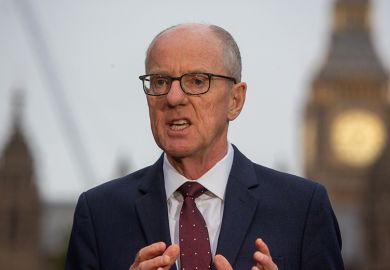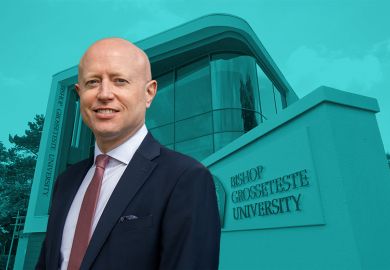A vice-chancellor has accused the government of marginalising universities’ involvement in teacher training because of a “fixation” that education departments are “Marxist hotbeds”.
Sir David Bell, vice-chancellor of the University of Reading and formerly the chief civil servant in the Department for Education, was set to make the comments in his keynote address to the Association of Science Education’s annual conference today.
In a wide-ranging speech – a text of which was made available to the media beforehand – on policymakers “trusting the frontline”, he said this must apply to universities and the “central role” they play in initial teacher training and continuing professional development. He added that ministers need to take a more “grown-up” view of policy and not “cut their noses off to spite their own faces”.
“I am hugely frustrated by the implementation of the School Direct system so far,” he said of the policy where schools recruit trainees. “And I urge the next government to fully review the system after May and change tack.”
He said it was “right to create a range of training routes” and he was in favour of the argument that “trainees need practical experience early”.
“But not if it means squeezing good, proven providers out of the sector. School Direct as currently configured is starting to choke off the best university postgraduate courses because of a false ideological fixation that university education departments are Marxist hotbeds. Here at Reading, I’m still searching to find my first Marxist in the Institute of Education!”
He added that universities were acting as a “safety net” under current policy, “stepping in at the last minute to take on unfilled places from schools”. “That will not be there if higher education institutions start pulling out of teacher training completely.”
“Individual schools do not need to take a broader strategic, national or even regional view of supply – but universities must. And the best initial teacher training and professional development is research-orientated,” he said.
“I want to see the next government working harder with us and industry – to create an effective market for teacher training; the right pay and reward incentives to attract the best into shortage subjects; better targeting at schools that need great teachers most; and make continuous specialist professional development a core contractual entitlement.”
A DfE spokeswoman said: “We want to attract the best and brightest graduates into the teaching – and School Direct is a vital part of that. It was set up in response to what schools had said they want – a greater role in selecting and recruiting trainees with the potential to be outstanding teachers.
“It is an increasingly popular teacher training route with more than a third of postgraduate trainees going through the programme. Universities will continue to play an important role in teacher training, working closely with schools to shape and deliver training and continuous professional development.”
Register to continue
Why register?
- Registration is free and only takes a moment
- Once registered, you can read 3 articles a month
- Sign up for our newsletter
Subscribe
Or subscribe for unlimited access to:
- Unlimited access to news, views, insights & reviews
- Digital editions
- Digital access to THE’s university and college rankings analysis
Already registered or a current subscriber?




